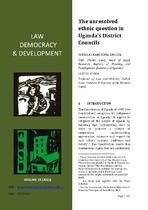| dc.contributor.author | Singiza, Douglas Karekona | |
| dc.contributor.author | de Visser, Jaap | |
| dc.date.accessioned | 2019-08-19T08:25:54Z | |
| dc.date.available | 2019-08-19T08:25:54Z | |
| dc.date.issued | 2015 | |
| dc.identifier.citation | Singiza, D.K. and de Visser J. (2015). The Unresolved Ethnic Question in Uganda’s District Councils. Law, Democracy & Development. 15: 107-126 | en_US |
| dc.identifier.issn | 2077-4907 | |
| dc.identifier.uri | http://hdl.handle.net/10566/4857 | |
| dc.description | This article focuses on Uganda’s quest to use decentralisation to promote the accommodation of diversity. It is a critical goal as the neglect or even suppression of diversity, be it ethnic, cultural or religious, can be linked to poverty, political despondency, alienation, and civil strife. It may even result in ethnic groups directly challenging the legitimacy of the state. | en_US |
| dc.description.abstract | This article examines the legal and constitutional framework for the election of district councils in Uganda because the design and practice of elections in Uganda has an impact on Uganda’s ability to follow through on the promise of respecting and encouraging diversity through decentralisation. The article concludes that the law and practice surrounding the election of district councils reveal the political exclusion of
ethnic minorities. It is argued that this is contrary to the stated policy objectives of decentralisation in Uganda and only serves to further promote the political dominance of the ruling party. | en_US |
| dc.description.sponsorship | Ford Foundation
Charles Stewart Mott Foundation
National Research Foundation | en_US |
| dc.language.iso | en | en_US |
| dc.publisher | Law, Democracy & Development | en_US |
| dc.subject | Ethnic question | en_US |
| dc.subject | Local democracy | en_US |
| dc.subject | Inclusive political mobilisation | en_US |
| dc.subject | Ethnic diversity | en_US |
| dc.subject | Uganda | en_US |
| dc.title | The unresolved ethnic question in Uganda’s district councils | en_US |
| dc.type | Article | en_US |

